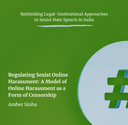Posts
Pandemic Technology takes its Toll on Data Privacy
— by Aman Nair and Pallavi Bedi — last modified Jun 26, 2021 06:52 AMThe absence of any legal framework has meant these tools are now being used for purposes beyond managing the pandemic.
On the legality and constitutionality of the Information Technology (Intermediary Guidelines and Digital Media Ethics Code) Rules, 2021
— by Torsha Sarkar, Gurshabad Grover, Raghav Ahooja, Pallavi Bedi and Divyank Katira — last modified Jun 21, 2021 11:52 AMThis note examines the legality and constitutionality of the Information Technology (Intermediary Guidelines and Digital Media Ethics Code) Rules, 2021. The analysis is consistent with previous work carried out by CIS on issues of intermediary liability and freedom of expression.
Does Google’s bid to replace third party cookies with FLOCs protect user privacy?
— by Maria Jawed — last modified Jun 18, 2021 10:01 AMIn its efforts to deprecate third-party cookies, Google, in August 2019, has brought an alternative plan with its new Privacy Sandbox platform. This plan promises to preserve anonymity when serving tailored advertising. While unveiling the system, Google explained that even though advertising is necessary to keep the web available to everyone, the web ecosystem is at risk if privacy policies do not keep pace with evolving expectations. But does this new framework help users in any way?
Cryptocurrency in Financial Statements
— by Aman Nair — last modified Jun 15, 2021 05:23 AMA Comparative Analysis of Cryptocurrency Reporting in Financial Statements
— by Aryan Gupta — last modified Jun 15, 2021 05:25 AMCIS Comments on the Phase III of E-Courts draft policy
— by Aman Nair, Arinjay Vyas, Pallavi Bedi, Garima Saxena — last modified Jun 03, 2021 12:33 PM
Beyond Public Squares, Dumb Conduits, and Gatekeepers: The Need for a New Legal Metaphor for Social Media
— by Amber Sinha — last modified May 31, 2021 10:23 AMIn the past few years, social networking sites have come to play a central role in intermediating the public’s access to and deliberation of information critical to a thriving democracy. In stark contrast to early utopian visions which imagined that the internet would create a more informed public, facilitate citizen-led engagement, and democratize media, what we see now is the growing association of social media platforms with political polarization and the entrenchment of racism, homophobia, and xenophobia.

Regulating Sexist Online Harassment as a Form of Censorship
— by Amber Sinha — last modified May 31, 2021 09:56 AMThis paper is part of a series under IT for Change’s project, Recognize, Resist, Remedy: Combating Sexist Hate Speech Online. The series, titled Rethinking Legal-Institutional Approaches to Sexist Hate Speech in India, aims to create a space for civil society actors to proactively engage in the remaking of online governance, bringing together inputs from legal scholars, practitioners, and activists. The papers reflect upon the issue of online sexism and misogyny, proposing recommendations for appropriate legal-institutional responses. The series is funded by EdelGive Foundation, India and International Development Research Centre, Canada.
Rethinking Data Exchange & Delivery Models
— by Pallavi Bedi, Amber Sinha — last modified Apr 08, 2021 06:36 AMComments and recommendations to the Guidelines for “Influencer Advertising on Digital Media”
— by Torsha Sarkar and Shweta Mohandas — last modified Apr 05, 2021 09:58 AMIn February, the Advertising Standards Council of India (ASCI) had issued draft rules for regulation of digital influencers, with an aim to "understand the peculiarities of [online] advertisements and the way consumers view them", as well as to ensure that: "consumers must be able to distinguish when something is being promoted with an intention to influence their opinion or behaviour for an immediate or eventual commercial gain". In lieu of this, we presented our responses.
Document Actions


